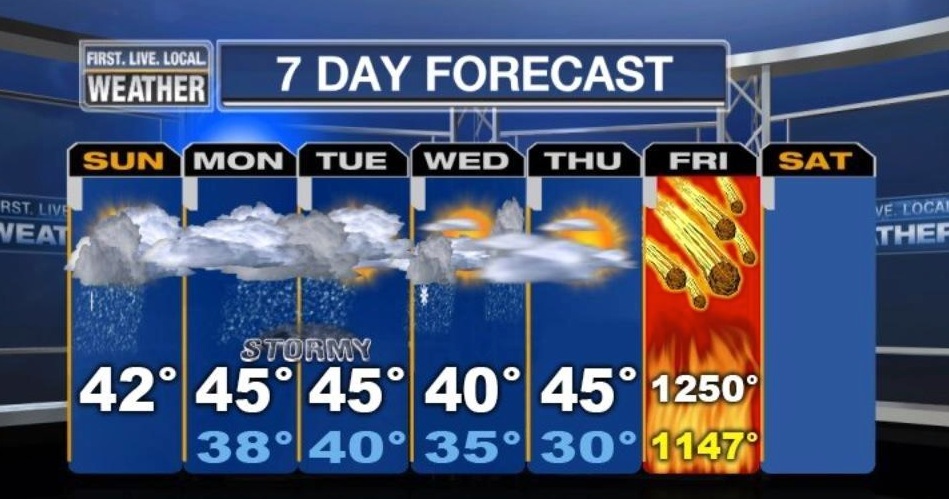Happy Endings!
As a precaution, this blog was written several days ago and set to auto-post at 12:01 AM Saturday, December 22, 2012. If I should be raptured on 12/21 (surely the result of a clerical error upstairs) then those of you who remain behind can read this. And if for some reason we’re all gone but the internet survives us, perhaps a subsequent species will find this amusing or informative.
For those of you just tuning in, 12/21/12 was the latest in a never-ending series of predicted dates for the end of the world, this one inspired, apparently, by a misreading of the Mayan calendar.
 How often does some leader predict the end of the earth? Would it surprise you that there have been at least thirty such predictions since the year 2000, and hundreds if not thousands before? Have a look at this partial list of failed apocalypses (apocalapses?) and wonder with me: why do we do this so often? Why do we have such an urgent need for things to end? What’s the rush? Why do we keep trying to end the world?
How often does some leader predict the end of the earth? Would it surprise you that there have been at least thirty such predictions since the year 2000, and hundreds if not thousands before? Have a look at this partial list of failed apocalypses (apocalapses?) and wonder with me: why do we do this so often? Why do we have such an urgent need for things to end? What’s the rush? Why do we keep trying to end the world?
And yet we are obsessed with knowing when and how it will end.
I have gone through the cancer journey with dozens and dozens of people at this point, sometimes individually, sometimes in the context of support groups. One of the first questions someone with a serious diagnosis will ask their doctor is, “how long do I have?” We want to know whether we have three weeks or three months or three years, or whether our chances at five year survival will be less than 50/50 or closer to 80/20.
The unspoken truth about the cancer journey is that it always ends in death. Always. 100 percent of the time. Sometimes a patient responds to treatment, recovers, and lives 40 or 50 or 70 years longer, cancer-free. But sooner or later, their life will come to a close, and when it does, it ends with death. 100 percent of the time. (Ironically, those with a non-cancer diagnosis face the same odds of the same ending. It’s 100 percent.)
Still, we do obsess about when and how. One of the things we notice in cancer support groups is that sometimes people who are still alive stop living; they become so fixated on how long they have left that they freeze like a deer in the headlights. They stop breathing, they stop communicating, they stop living today because they are waiting for something that might not happen for months, years, or decades.
A very wise woman, Barbara, once took my scared head in her hands and said, “honey, the goal is to live until you die. Just live until you die. If you’re alive today, live. Don’t worry about how long you have; just live today, fully.” (That was eighteen years ago, and I still miss Barbara.) One woman in our group, Pamela, apparently took her advice: given three months to live by her doctors, Pamela lived for another five and a half years, long enough to adopt a child and found a non-profit foundation.
It is, surprisingly, much harder to do what Barbara suggested–live until you die–than it is to scour the internet looking for survival statistics for various cancers at various stages. For many people, managing unlimited possibility is much more difficult than managing limited options. Be curious with me: why is that? Why is it easier for some people to plan the end than to figure out what to do with the middle?
 Here is one answer: human beings find ambiguity stressful. We have difficulty with the unknown; unanswered questions (literally) raise our blood pressure. Ever wonder why the answer to a casual “how are you?” is almost always “fine, thanks, and you?” even when that’s not true? Ambiguity control. We don’t like the possibility of a hundred answers to that question; we’ve rehearsed it down to one, and we often don’t bother with truth in that casual transaction.
Here is one answer: human beings find ambiguity stressful. We have difficulty with the unknown; unanswered questions (literally) raise our blood pressure. Ever wonder why the answer to a casual “how are you?” is almost always “fine, thanks, and you?” even when that’s not true? Ambiguity control. We don’t like the possibility of a hundred answers to that question; we’ve rehearsed it down to one, and we often don’t bother with truth in that casual transaction.
We have varying levels of skill in being able to sit comfortably with ambiguity. However, some people have such a limited capacity for ambiguity that they are more comfortable with the certainty of death than they are with the unpredictability of life. Some people have pathologically limited capacity to sit with ambiguity.
And so, some people are much more comfortable living with predictable doom–with a guaranteed end–than they are facing the endless, open-ended, unlimited possibilities of life. In organizational behavior, we sometimes refer to this group as “black-and-white thinkers,” people who become more comfortable when there are FEWER options. These are people who get stressed out by too many solutions to a problem; instead, they construct comfort for themselves by limiting the possibilities.
You can see countless examples of black-and-white thinking, and it basically follows this subtext: “the idea of an open-ended life full of possibility is too threatening to me, too confusing; it demands too much from me. I prefer the comfort of limited options, followed by a guaranteed and predictable death.” You see it in political dialogue almost every day. Let me show you some examples.
 Sexuality and morality are two very, very complicated areas; there is much we do not know, and some we cannot ever know. Sometimes moral choices are complicated, and there’s no perfect way. There are better ways, but no perfect way. Sometimes sexuality is mysterious, and unpredictable.
Sexuality and morality are two very, very complicated areas; there is much we do not know, and some we cannot ever know. Sometimes moral choices are complicated, and there’s no perfect way. There are better ways, but no perfect way. Sometimes sexuality is mysterious, and unpredictable.
To solve that tremendous ambiguity, some have invented behavioral belief systems that say, for example, “choose this lifestyle and you’ll be doomed to eternal suffering in a lake of unquenchable fire; live the opposite lifestyle and you’ll be rewarded with eternal bliss in unending paradise.” Buddhists will immediately notice that there’s no “middle way” in this set of options, no grays. In the afterlife, you either get a mansion or you’re out on the street; if you’d be content with a nice little condo somewhere, you’re out of luck. This is black and white thinking, a neat, tidy, simplistic solution to an utterly unanswerable set of questions. But it does successfully reduce ambiguity for people who lack capacity to carry ambiguity in that area of their lives.
In some cases we are so uncomfortable with ambiguity that it is easier for us to pretend we have an answer–to make something up–rather than admit we still have the question, unanswered. Some people hate unanswered questions so much that they’re willing to invent preposterous answers, and live by them, rather than leave the question on the table, unanswered.
Take as an example the recent horrible massacre in Newtown, Connecticut. Quite likely, none of us will ever be able to answer the question of why a young man with an assault weapon would shoot 6- and 7-year-old children. Of all life’s mysteries, this has got to be one of the big ones.
Yet, that did not stop one of our dear brothers-of-limited-capacity from linking the shooting of 6-and 7-year-old children to the passage of gay marriage laws. Apparently, God is not mighty enough to control the index fingers of voters pulling the levers for same-sex marriage. However, the Almighty IS somehow not just able, but willing, to use the index finger of a 20-year-old mentally ill man with an assault weapon, punishing a bunch of innocent 6- and 7-year-olds in order to make a point about the voting God declined to control.
So now you have an answer to your question, “why did this happen.”
REALLY?
Sometimes we are so uncomfortable with unanswered questions that we’re willing to invent answers, ridiculous answers, rather than sit with the questions.
We’re uncomfortable enough that we pretend the answers make sense, and if we’re really uncomfortable, we gather other uncomfortable people around us and teach them to pretend as well. All because the certainty of death is less scary to us than exploring the full-blown, sometime glorious, sometime tragic, always endlessly possible, unanswered and unanswerable, unlimited potential that each of our lives puts before us.
To be fully alive is completely overwhelming–an overwhelming number of options, possibilities, potentials, and choices. I can, genuinely, and with empathy, understand why some choose a certain death over an uncertain life.
Some would choose a guaranteed unhappy ending over an unknown and uncertain middle.
 I close with a quotation of Marianne Williamson:
I close with a quotation of Marianne Williamson:
“Our deepest fear is not that we are inadequate. Our deepest fear is that we are powerful beyond measure. It is our light, not our darkness that most frightens us! We ask ourselves, Who am I to be brilliant, gorgeous, talented, and fabulous? Actually, who are you not to be? You are a child of God. Your playing small does not serve the world. There’s nothing enlightened about shrinking so that other people won’t feel insecure around you. We are all meant to shine, as children do. We were born to make manifest the glory of God that is within us. It’s not just in some of us; it’s in everyone and as we let our own light shine, we unconsciously give others permission to do the same. As we are liberated from our own fear, our presence automatically liberates others.”
If you wake up on the morning of 12/22/12, congratulations: you’re going to die. I can’t tell you when or how, but there’s a one hundred percent chance of it.
But if you find contemplating your own death challenging, just wait until you face the full-blown, endless, infinite possibilites of your life. You’ll shit your pants. Life–fully engaged, with all options on the table–is utterly terrifying, utterly exhilarating.
May you live until you die. Live hard. Live passionately. Live fearlessly. Live right into the unanswered questions; stare them in the face. May you decline ridiculously simplistic answers to ridiculously complicated questions. May you sit with the unfolding, the mysterious, unlimited, manifest glory of God in you, Emmanuel, God-in-us, God-among-us.
The end will get here eventually; let’s not rush it.
May you die with more unanswered questions than you came in with. Now that’s a happy ending. Happy Holidays.
Have thoughts you’d like to share?
Touch Practice is a sacred practice for me, and part of that is keeping confidences sacred. While a name and e-mail address are required to post a comment, feel free to use just your first name, or a pseudonym if you wish. Your e-mail address will never be seen by or shared with anyone. It is used to prevent spam and inappropriate comments from appearing in the blog. I’d really like to hear from you!















Kevin. Thank you for your work and the blessing and challenge of this blog. Death is something that I have always held as a doorway and sometimes I have wished for it but now have found with the help of God, a place of contentment. My life is full of mountain tops and valley floors and all those steps on my journey take me towards perfect love. I hope some day to meet you but for now have a blessed and peaceful Christmas. I’ll finish with an old Irish blessing – note how holding appears there too: may the road rise to meet you, may the wind be always at your back and until we meet again may God hold you in the hollow of His hands.
Thank you, my friend, and may you also have blessings and contentment this holiday. I look forward to meeting some day.
Thanks for these challenging thoughts, Kevin. Right now I’m an the airport waiting for my flight, typing away with my headphones plugged in an music pouring into my head. I’m faintly aware that right in front of me, there are people all around me and a wall of glass to the outside world and a clear blue sky with birds flying in the sky (real ones.) When I look up from my computer, I see other people, more than half of them are staring at their own devices. What is this? I and everyone around me pretending that there is nothing interesting outside of ourselves right now. It kind of feels like visiting in a hospital; you don’t really want to know what’s going on right in front of your eyes. Sitting with ‘what is’ becomes more and more difficult between the distractions in my head and the lure of my beautiful new computer. I wonder, if I knew I was terminally sick with anything, if it would be enough for me to sit here and see what there is to see and be satisfied with it. So – bottom line – reading your article on my lovely computer resulted in this comment, and now, the closing of the laptop. I’m going to see what there is to sit with, and how long it takes for me to either enjoy it or get tired of it.